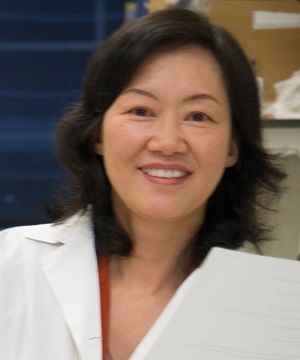Latest News
Research & Innovation
Massey researcher finds new strategy for fighting brain cancer
Mar 23, 2021

Most people relate cholesterol to heart health, but it is also a critical component in the growth and spread of brain cancer. VCU Massey Cancer Center researcher Suyun Huang, Ph.D., recently discovered how cholesterol becomes dysregulated in brain cancer cells and showed that the gene responsible for it could be a target for future drugs.
The mean survival of patients with the most common and aggressive type of brain cancer, glioblastoma multiforme (GBM), is 14 months. The need to find new, effective treatments is urgent and has driven Huang, a member of the Cancer Biology research program at Massey, to detail the workings of numerous genes, proteins, enzymes and other cellular components that contribute to brain cancer growth. Her studies are revealing a biological “roadmap” showing previously unknown functions of genes.

Huang’s most recent study, published in the journal Nature Communications, pinpoints a gene called YTHDF2 as a crucial link in a chain leading to the development and growth of GBM. It works through a process set in motion by another gene with a well-established reputation for driving cancer progression, EGFR.
“These findings are exciting because we can potentially target YTHDF2 expression by using YTHDF2 small molecule inhibitors to control glioblastoma tumor growth and spread,” says Huang, who is also the Paul M. Corman, M.D., Chair in Cancer Research at Massey Cancer Center and a professor in the Department of Human and Molecular Genetics at VCU School of Medicine. “Our experiments also showed that we can stop the formation and growth of brain cancer cells by blocking YTHDF2 expression, so it could also be a powerful target for drug development.”
EGFR is frequently overactivated in many aggressive cancers, including GBM. Huang’s team found that EGFR drives the overexpression of TYHDF2, which then sustains increased cholesterol levels for the invasive growth and development of GBM cells through a process that degrades the LXRα and HIVEP2 genes. LXRα is known to regulate cholesterol levels within cells and HIVEP2 is involved in the development of brain tissue.
Huang’s study is the first to describe this cell signaling cascade, and it helps fill in important parts of the “roadmap” leading to GBM. It is also the first study to show that N6-methyladenosine (m6A), a DNA modification found in nearly all cell-based life forms, plays a role in brain tumor growth and cholesterol metabolism. Huang’s team found that the increase in YTHDF2 expression caused m6A modifications in the mRNA of LXRα and HIVEP2, which inhibited their functions.
Next, Huang and her collaborators plan to evaluate different YTHDF2 inhibitors and establish their effects in lab and animal models.
“EGFR inhibition and cholesterol regulation are both promising strategies for GBM treatment,” says Huang. “Our study offers an exciting new approach that could potentially work hand-in-hand with these strategies to regulate and treat GBM.”
Additional researchers involved in this study include Runping Fang, Ph.D., and Peng Li, M.D., both from the Department of Human and Molecular Genetics at VCU School of Medicine; Xin Chen, Ph.D., Sicong Zhang, Ph.D., Qing Guo, Ph.D., and Li Ma, Ph.D., all from MD Anderson Cancer Center; Youqiong Ye, Ph.D., from the University of Texas Health Science Center; and Zhongyu Zou, Ph.D., Chuan He, Ph.D., and Hailing Shi, Ph.D., all from the University of Chicago.
This research was supported in part by National Institutes of Health grant R01CA182684, the Paul M. Corman, M.D., Chair in Cancer research endowment fund, and, in part, by VCU Massey Cancer Center’s National Cancer Institute Cancer Center Support Grant P30 CA016059.
Written by: John Wallace
Related News
Research & Innovation, Center News & Funding
Genetic code deploys cancer mafia, new targeted drug gives them an offer they can’t refuseSep 3, 2025
Research & Innovation, Center News & Funding
Researchers awarded $7.3 million grant to launch groundbreaking breast cancer clinical trialAug 28, 2025
Research & Innovation
Vesalius cell-mapping tool provides insightful multi-layered view of cancer behaviorAug 25, 2025

Get access to new, innovative care
Treatments in clinical trials may be more effective or have fewer side effects than the treatments that are currently available. With more than 200 studies for multiple types of cancers and cancer prevention, Massey supports a wide array of clinical trials.

Find a provider
Massey supports hundreds of top cancer specialists serving the needs of our patients. Massey’s medical team provides a wealth of expertise in cancer diagnosis, treatment, prevention and symptom management.
